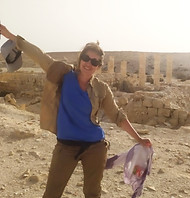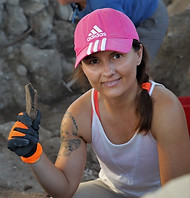
Mitzpe Shivta is located in the northern Negev Desert close to one of the main holy land pilgrimage routes that connected Jerusalem and Gaza on the Mediterranean shore, Mount Sinai and Egypt. Due to its church, chapel, fortification, as well as numerous rock-cut rooms adorned with pilgrim inscriptions and Christian decorations, early visitors addressed Mitzpe Shivta as a Christian monastery and pilgrim xenodochium.
Radiocarbon data point to an occupation of Mitzpe Shivta between the 5th and 9th centuries CE – an era marked by the rise and fall of a short-lived late antique agricultural florescence of the Negev Desert. The heyday of the Negev was characterized by the emergence of large settlements supplied by sophisticated water management and farms in their immediate hinterland. Wine became the major cash crop of the desert settlers and was traded as a luxury export in the entire Mediterranean and beyond. Decline of this prosperity is evident by the late 6th century CE. It is also in this very short moment of economic blossom, when the first Christian monasteries sprang up in the desert region – many of which survived the late 6th century crisis and the subsequent Islamic Conquest (634 CE).
The character and agency of early monasteries in the Negev's rise and fall and the role of monastic institutions as repositories of antique agricultural knowledge and resilience in times of economic deterioration are still insufficiently researched. Answers to these questions may be found in Mitzpe Shivta. History of research at Mitzpe Shivta indicates that the site was never fully explored and thus did not contribute to the plethora of research on the rise and fall of the Negev agricultural society by the end of the Byzantine era. In this project, therefore, the well-preserved site is to be systematically archaeologically studied for the first time applying a wide range of methods from the fields of epigraphy, bioarchaeology, microgeoarchaeology and digital archaeology.






















TEAM




SINA CLARA LEHNIG
sina.lehnig@fu-berlin.de
Link
GIL GAMBASH
ggambash@univ.haifa.ac.il
Link
GUY BAR-OZ
guybar@research.haifa.ac.il
Link
BEATRICE PESTARINO
beatrice.pestarino@gmail.com
Link


MICHELLE GIL
7michellegil7@gmail.com
RUTH SHAHACK-GROSS
rgross@univ.haifa.ac.il
Link
LATEST PUBLICATIONS

Theodor Wiegand in Mitzpe Shivta. Spolia and Heritage Protection along the Ottoman Military Railway, Archäologischer Anzeiger 2, 1-44, 2025
From Early Christianity to Early Islam: new radiocarbon dates extend occupation period of Mitzpe Shivta in the Negev Desert, CARMEL, 2025
Resurrecting Mitzpe Shivta: connections between monasticism and economy in the Late Antique Negev Desert, Antiquity Project Gallery 97 (396), 2023
Praying for a place in the Book of the Living. A new Byzantine Inscription from Mitzpe Shivta, ZPE 228, 2024
Photo: DAI-Z-AdZ-NL-Luftbild-322-1, Mishrefe






